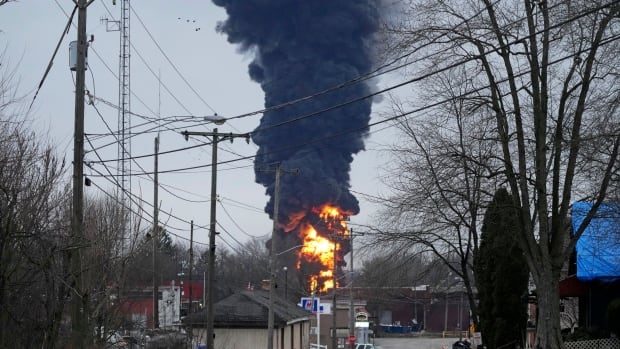After a catastrophic 38-train car derailment in East Palestine, Ohio, some officials are raising concerns about a type of toxic substance that tends to stay in the environment.
Last week, the U.S. senators from Ohio, sent a letter to the state’s environmental protection agency expressing concern that dioxins may have been released when some of the chemicals in the damaged railcars were deliberately burned for safety reasons. They joined some of the town’s residents and environmentalists from around the U.S. calling for state and federal environmental agencies to test the soil around the site where the tanker cars tipped over.
Here’s a look at dioxins, their potential harms and whether they may have been created by burning the vinyl chloride that was on the Norfolk Southern train.
Highly toxic, persistent compounds
Dioxins refer to a group of toxic chemical compounds that can persist in the environment for long periods of time, according to the World Health Organization. They are created through combustion and attach to dust particles.
Residents near the fire could have been exposed to dioxins in the air that landed on their skin or were breathed into their lungs, said Frederick Guengerich, a toxicologist at Vanderbilt University.
Skin exposure to high concentrations can cause what’s known as chloracne — an intense skin inflammation, Guengerich said.
The U.S. government is ordering railway operator Norfolk Southern to clean up contaminated soil and water at the site of a hazardous train derailment in East Palestine, Ohio, where officials are trying to convince wary residents their tap water is safe to drink.
But the main pathway that dioxin gets into human bodies is not directly through something burning. It’s through consumption of meat, dairy, fish and shellfish that have become contaminated. That contamination takes time.
“That’s why it’s important for the authorities to investigate this site now,” said Ted Schettler, a physician with a public health degree who directs the Science and Environmental Health Network, a coalition of environmental organizations.
“Because it’s important to determine the extent to which dioxins are present in the soil and the surrounding area.”
Does burning vinyl chloride create dioxins?
Linda Birnbaum, a leading dioxins researcher, toxicologist and former director of the National Institute for Environmental Health Sciences, said that burning vinyl chloride does create dioxins. Other experts agreed the accident could have created them.
The “tremendous black plume” seen at East Palestine suggests the combustion process left lots of complex carbon compounds behind, said Murray McBride, a Cornell University soil and crop scientist.

McBride said it will be hard to say for sure whether these compounds were released until testing is done where the train cars derailed.
Which is likely why residents, politicians, environmentalists and public health professionals are all calling for state and federal environmental agencies to conduct testing at the derailment site.
Routes to the environment
There is already some level of dioxins in the environment — they can be created by certain industrial processes, or even by people burning trash in their backyards, McBride said.
Once they are released, dioxins can stick around in soil for decades. They can contaminate plants, including crops. They accumulate up the food chain in oils and other fats.
In East Palestine, it’s possible that soot particles from the plume carried dioxins onto nearby farms, where they could stick to the soil, McBride said.

“If you have grazing animals out there in the field, they will pick up some of the dioxins from soil particles,” he said. “And so some of that gets into their bodies, and then that accumulates in fat tissue.”
Eventually, those dioxins could make their way up the food chain to humans. Bioaccumulation means that more dioxin can get into humans than what’s found in the environment after the crash.
“[Animals] don’t metabolize and get rid of dioxins like we do other chemicals,” Schettler said, and it’s stored in the fat of animals that humans eat, like fish, and builds up over time, making the health effects worse.
Should residents be concerned?
Birnbaum and Schettler agreed that residents have reason for concern about dioxins from this accident.
Even though they are present in small amounts from other sources, the large amount of vinyl chloride burned off from the train cars could create more than usual, McBride said.
“That’s my concern, that there could be an unusual concentration,” he said. “But again, I’m waiting to see if these soils are analyzed.”
It takes between seven and 11 years for the chemical to start to break down in the body of a person or animal. And dioxins have been linked with cancer, developmental problems in children and reproductive issues and infertility in adults, according to the National Institute for Environmental Health Sciences.
Still, Guengerich thought that other potential health risks from the derailment — such as the concern that exposure to the vinyl chloride itself could cause cancer — may be more pressing than the possible dioxins: “I wouldn’t put it at the highest level on my list,” he said.
Even so, most experts thought it was important to test the soils for dioxins — even though that process can be difficult and costly.
“The conditions are absolutely right for dioxins to have been formed,” Schettler said. “It’s going to be terribly important to determine that from a public health perspective, and to reassure the community.”



